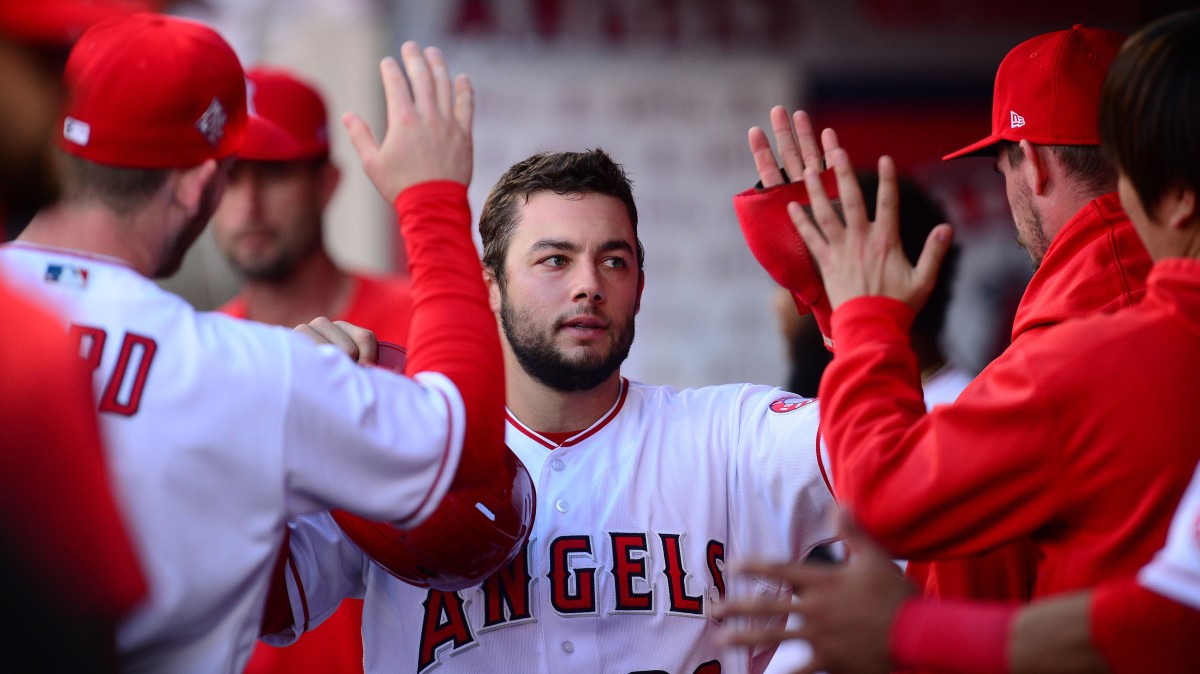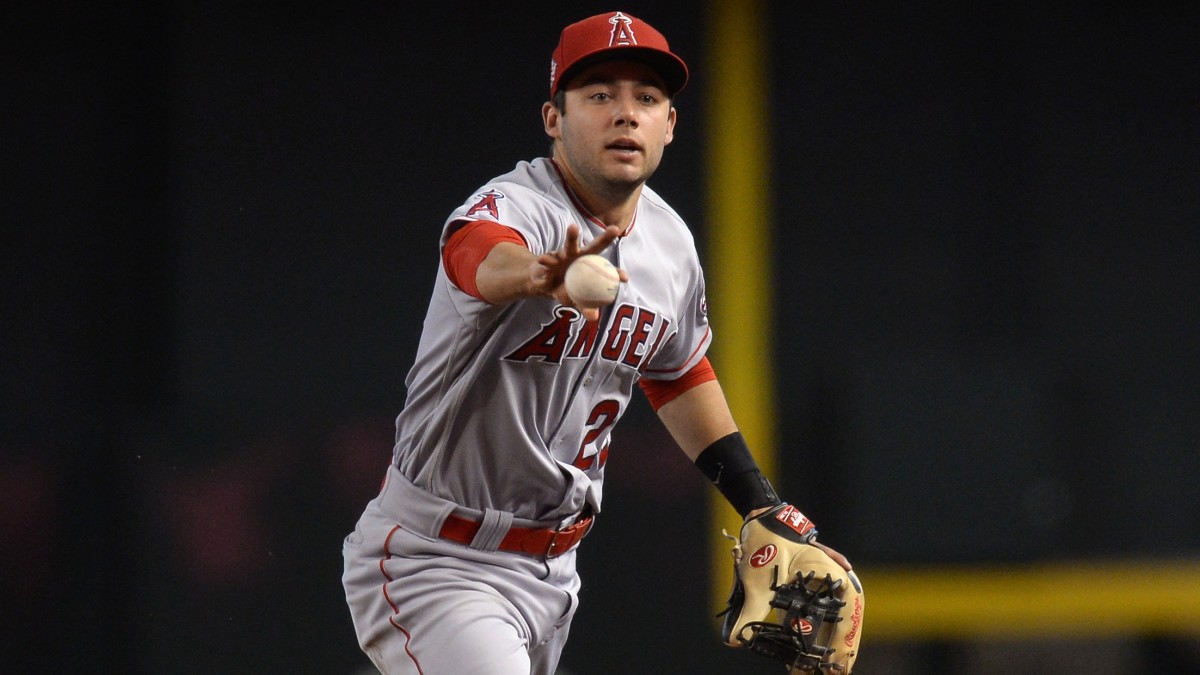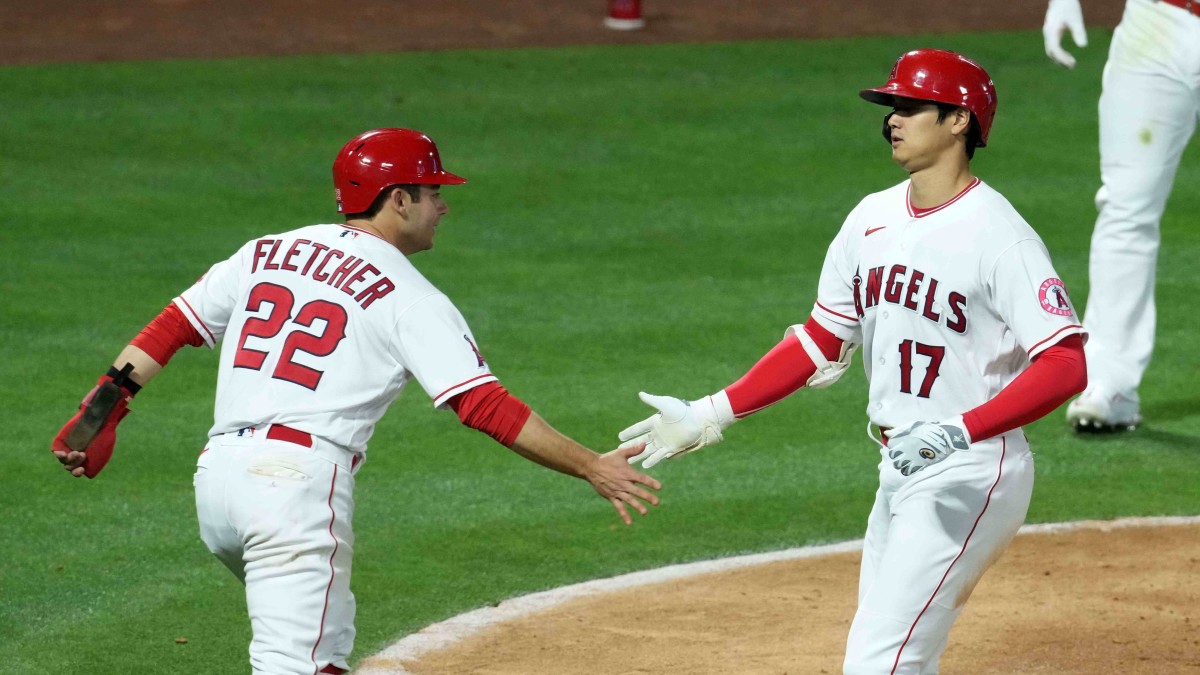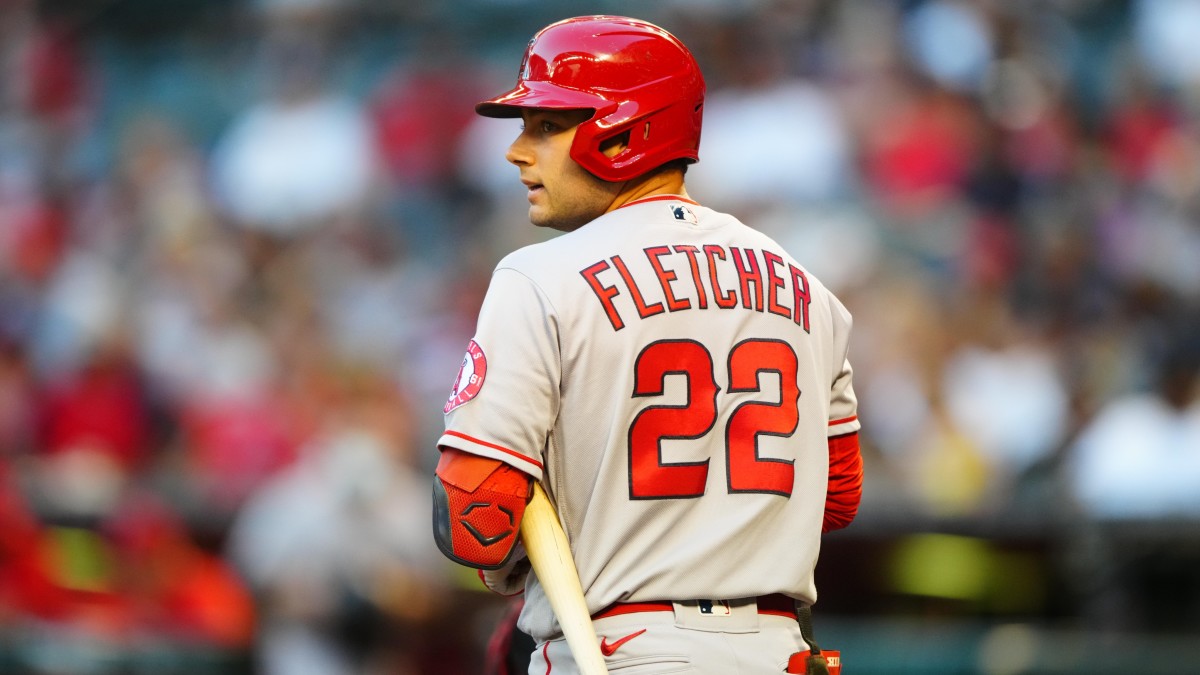Angels’ David Fletcher Is Baseball’s Most Anonymous Talent

In the age of ever-increasing exit velocities and launch angles, David Fletcher stands out. The Angels’ second baseman ranks dead last in average exit velocity among qualified major-league hitters and has the second-lowest strikeout rate in the American League. He’s also second in the AL in hits and owns the longest hitting streak of the season, doing so with a quiet confidence his manager likens to Joe Namath’s.
On a team with three-time MVP Mike Trout, two-way phenomenon and 2021’s presumptive AL MVP Shohei Ohtani, and All-Star corner infielders Anthony Rendon and Jared Walsh, it’s the 5' 9" Fletcher who has paced the lineup from the leadoff spot for most of the year. (Recently, he and Ohtani have flipped spots, with Fletcher now batting second.) The soft-spoken 27-year-old is not one to draw attention to himself, but his play this season has been impossible to ignore, and his teammates are more than happy to do the talking for him.
“Fletch is a unique type of player. He knows how to play the game. His IQ in baseball is very high,” shortstop José Iglesias said earlier this month. As if that wasn’t enough, Iglesias said Fletcher’s savvy extends from the diamond to the card table. “He teaches me about poker as well. He’s a good poker player.”
And how does Fletcher describe himself?
“I just enjoy competing in everything,” Fletcher says. “And I hate losing.”

That high-level baseball acumen and renowned stoicism are traits Fletcher displayed long before arriving in the big leagues in 2018. On a middling team that shares a market with the defending champion Dodgers, his cool demeanor and understated skillset make him an anonymous star and one baseball’s best-kept secrets.
Jason Gill remembers the first time he saw Fletcher play in person. It was 2011, and Gill—then the head coach at Loyola Marymount who now coaches at USC—was watching the diminutive Fletcher field ground balls at one of LMU’s youth baseball camps. Though Fletcher was just a high school sophomore at the time, it didn’t take long for Gill to make up his mind.
“I turned to my recruiting coordinator at the time, and I said, ‘I don’t care what it takes, that guy needs to be on our team,’ ” Gill recalls. “That guy could play shortstop for us right now. ... They were like, ‘Do you want to see him hit?’ And I said, ‘I don’t need to see him hit. It doesn’t matter to me. If that’s how he plays shortstop he could hit .110. I don’t care.’ ”
Fletcher would hit considerably better than .110 at LMU. In two seasons, he hit .318/.374/.395 in 111 games, twice earning first-team All-WCC honors. He was the conference’s Defensive Player of the Year as a freshman and earned multiple Freshman All-America selections, and he was eventually drafted in the sixth round by the Angels in 2015.
Before proving he could hit at the college level, though, Gill had already seen enough to know he’d found his future shortstop. In the team’s first meeting of the season after Fletcher arrived on campus, Gill had each player stand up in front of the group to introduce themselves, saying where they were from, what year they were and what position they played. An older, returning player stood up and said to the group, “I’m the shortstop,” which prompted Gill to laugh to himself.
“In my head I was like, ‘No, no you’re not,’” Gill says. “Fast forward two months down the road, and these guys are working out every day and taking ground balls. That kid that had said that took himself and moved over to second base without me saying anything.”
Fletcher quickly earned a reputation as someone dedicated to his defensive craft. He would regularly arrive to the field early to take ground balls, then stay late to get in even more work. The rare instances in which he made a mistake became noteworthy moments that prompted slack-jawed reactions from the rest of the team.
“It became a joke to the point where if he made an error, the whole practice would stop for like three seconds and stare, and then resume,” Gill says. “Even in a game, he’d make an error and everybody in our dugout would get quiet for like three seconds. And then someone would crack a joke, ‘We won’t see that for two more months.’ ”

That same work ethic earned Fletcher the starting shortstop job four years earlier at Cypress High School in Cypress, Calif., less than 15 miles from Angel Stadium. Even then, there were doubts about his ability to hit—so much so that when the varsity team needed a replacement shortstop after the senior starter injured his knee shortly before the season began, coach John Weber opted to go with a different freshman who he thought would hit better than Fletcher. It took one scrimmage to realize he’d made a mistake.
“He made a ton of errors—out of position all the time. More than the physical stuff, he was over his skis,” Weber says. “It took that one game for me to go, ‘That’s it, we’re going with Fletcher.’ And the rest is history.”
Fletcher’s preternatural ability to read the game and make quick decisions is what earned him opportunities playing against older kids. His instincts, slick fielding and self-belief were always his calling cards.
“When he was young, people told him that he would never be able to play, he wasn’t going to be very good, he was too small or too this or that,” Weber says. “He is one of those people that you can’t tell that to. He’s gonna do everything in his power to prove you wrong.”
At every level, Fletcher has excelled in the batter’s box by pestering opposing pitchers, spraying the ball to all fields and rarely missing when he swings. He has the highest contact rate and the most opposite-field hits in the majors this season. His status as a “hand-eye freak,” as Gill puts it, enables him to put the bat on the ball no matter how far out of the zone it is.
Every pitch is the ideal pitch for David Fletcher. pic.twitter.com/OEdImlASl6
— Los Angeles Angels (@Angels) August 22, 2020
“I’ve definitely always had good hand-eye coordination, so that one’s probably more of a natural thing,” Fletcher says. “That goes into defense, too, but my defense is something I’ve always worked hard on, and I feel like that’s made me good defensively. The hand-eye has always been there and gave me a chance to always hit.”
That hand-eye coordination is what propelled Fletcher to his 26-game hitting streak earlier this season, coming two games shy of tying the franchise’s all-time record. From June 13 to July 17, Fletcher batted .454/.468/.630 with 13 multi-hit games, raising his season batting average from .255 to .318 in the process. It didn't dip below .300 again until he went 0-for-4 Monday night vs. the Yankees. He's batting .297 entering play Thursday.
That kind of production is what the Angels have desperately needed at the top of their lineup, particularly in a season when Trout has missed 83 games and Rendon has missed 64. Fletcher has come through when the team has needed it most, batting .317 with runners in scoring position this year and .333 in high-leverage situations.

What he lacks in the ability to hit the ball hard, he makes up for with a knack to hit the ball in specific spots to beat opposing defenses. A look at his spray chart shows an even distribution of hits across all parts of the diamond.
“You can’t defend him, because when you move somewhere he’ll hit it where you’re not,” Gill says. “It’s the most uncanny, elite performance skill I’ve ever seen. If you move your right fielder in, he’s gonna hit it over the right fielder’s head. I don’t know how, but he will. It’ll fall where they’re not.”
The doubts about his ability to hit persisted even after he reached the majors. After he hit his first home run as a rookie, the Angels’ dugout opted against using their typical silent treatment for a player’s first career homer and instead greeted Fletcher warmly in the dugout because, in then manager Mike Scioscia’s words, “We don’t know how many more Fletch is going to hit.”
Since then, Fletcher has hit 11 more home runs, and the perception that he’s too small to excel offensively is one that still drives him, even if he doesn’t say so out loud.
“I think he’s always been having to fight the stigma of ‘He’s too small. He’s not good enough.’ I think that fuels his fire,” Gill says. “I don’t think as much anymore, but I guess it’s got to burn there innately. I don’t think that you could ever get rid of that. I think that for sure plays a role in how he goes about his day.”

Fletcher’s success is proof that there still exists space for old-school players in today’s game. In a year where the league batting average is flirting with the all-time low and there have been a record number of no-hitters, Fletcher’s approach flies in the face of the three true outcomes that have been popularized in the Statcast era, when exit velocity and barrel statistics are readily available. By those measures, Fletcher will likely never stand out, but he’s thrived at the highest level precisely because he’s different, not in spite of that.
His production and style of play have long since earned him the status of fan favorite among Angels supporters. While Fletcher might fly under the radar of the casual fan, the Angels are keenly aware of his value to the franchise, as evidenced by the five-year, $26 million contract extension the two sides agreed to at the start of the season. The deal has two team options, as well, all but ensuring Fletcher will spend his entire prime playing for the team he grew up rooting for.
All along the way, he’s endeared himself to everybody he’s encountered, using an ability to connect with people that Gill likens to Ferris Bueller. Though nobody would expect Fletcher to serenade parade goers with “Twist and Shout,” he’s very likely to keep playing baseball in his own style, winning over new fans each step of the way.
“He doesn’t do anything to try and fit in; he just is him. And I think people can appreciate that,” Gill says. “He just does his work everyday, and then after time just earns respect.
“There’s nothing superficial about him. He’s just real. He’s just David.”
More MLB Coverage:
• Can the Padres Hold Their Playoff Spot?
• Return of Bruised Bombers Bolsters Red-Hot Yankees
• The Revival of Joey Votto
• Better Late: Old-School Brian Snitker Is Thriving in Today's MLB
